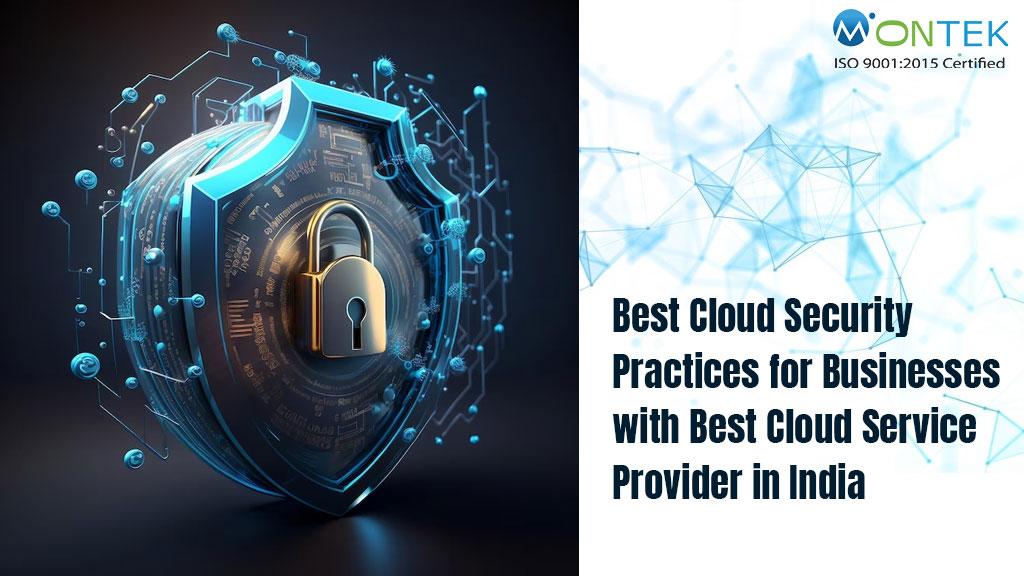
02
NovBest Cloud Security Practices for Businesses with Best Cloud Service Provider in India
In today's interconnected digital landscape, cloud computing has become an integral part of business operations. While the cloud offers numerous benefits, ensuring robust cloud security is paramount to safeguarding sensitive data and maintaining trust with customers. In this blog post, we will delve into essential cloud security practices that businesses should adopt to protect their assets and maintain a strong security posture.
Choose a Trusted Cloud Provider :
The foundation of effective cloud security begins with selecting a reputable and reliable cloud service provider that offers the best cloud computing services. Conduct thorough research to assess their security certifications, compliance measures, and track record in safeguarding customer data. Look for providers that offer transparent security policies and provide robust encryption mechanisms.
Implement Strong Access Controls :
Implement strict access controls to limit who can access your cloud resources. Utilize multi-factor authentication (MFA) for user accounts, requiring an additional layer of verification beyond passwords. Assign role-based access control (RBAC) to ensure that employees only have access to the data and services necessary for their roles.
Encrypt Data at Rest and in Transit :
Encryption is a fundamental aspect of cloud security. Ensure that data is encrypted both at rest, when stored in the cloud, and in transit, as it travels between your network and the cloud provider. Utilize encryption protocols such as SSL/TLS for data in transit and encryption mechanisms provided by the cloud provider for data at rest.
Regularly Update and Patch Systems :
Cloud providers regularly update and patch their systems to address vulnerabilities. Stay vigilant and ensure that your cloud-based applications and systems are always up-to-date with the latest security patches. Regularly monitor the provider's security advisories to stay informed about potential threats.
Conduct Regular Security Audits and Assessments :
Perform routine security audits and assessments of your cloud environment to identify vulnerabilities, misconfigurations, and potential risks. Utilize tools that scan for security gaps and perform penetration testing to simulate real-world attacks. Address any issues promptly to maintain a secure infrastructure.
Implement Network Security Controls :
Configure network security controls such as firewalls, intrusion detection, and intrusion prevention systems to monitor and protect traffic to and from your cloud environment. Use virtual private networks (VPNs) for secure communication between on-premises systems and the cloud.
Backup and Disaster Recovery Planning :
Develop a comprehensive backup and disaster recovery plan to ensure business continuity in case of data loss or system failures. Regularly back up critical data and test the restoration process to ensure its effectiveness. Cloud-based backups provide an additional layer of redundancy.
Educate and Train Employees :
Human error remains a common cause of security breaches. Provide ongoing cybersecurity training and education to employees to raise awareness about security threats, best practices, and how to identify phishing attempts. Encourage a culture of security awareness throughout the organization.
Monitor and Analyze Activity Logs :
Implement robust monitoring and logging mechanisms to track user activity and system behavior. Analyze logs for any suspicious activities or anomalies that may indicate unauthorized access or potential security breaches. Implement real-time alerts to respond promptly to incidents.
Develop an Incident Response Plan :
Prepare for security incidents by creating a well-defined incident response plan. Outline the steps to take in the event of a breach, including communication protocols, containment measures, and recovery procedures. Regularly update and test the plan to ensure its effectiveness.
Cloud security is a shared responsibility between businesses and their cloud providers. By following these cloud security best practices, businesses can leverage the best cloud computing services to establish a strong defense against cyber threats, protect sensitive data, and maintain the trust of their customers.
In an ever-evolving threat landscape, proactive security measures and a commitment to continuous improvement are essential to ensure the long-term success and resilience of cloud-based operations.
Enhance your cloud security today with the expertise of Montek Services, the best cloud service provider in India. Safeguard your data, mitigate risks, and ensure business resilience. Partner with us to implement these best practices and fortify your cloud environment. Your data's security is our priority.


Leave Reply
Your email address will not be published. Required fields are marked *